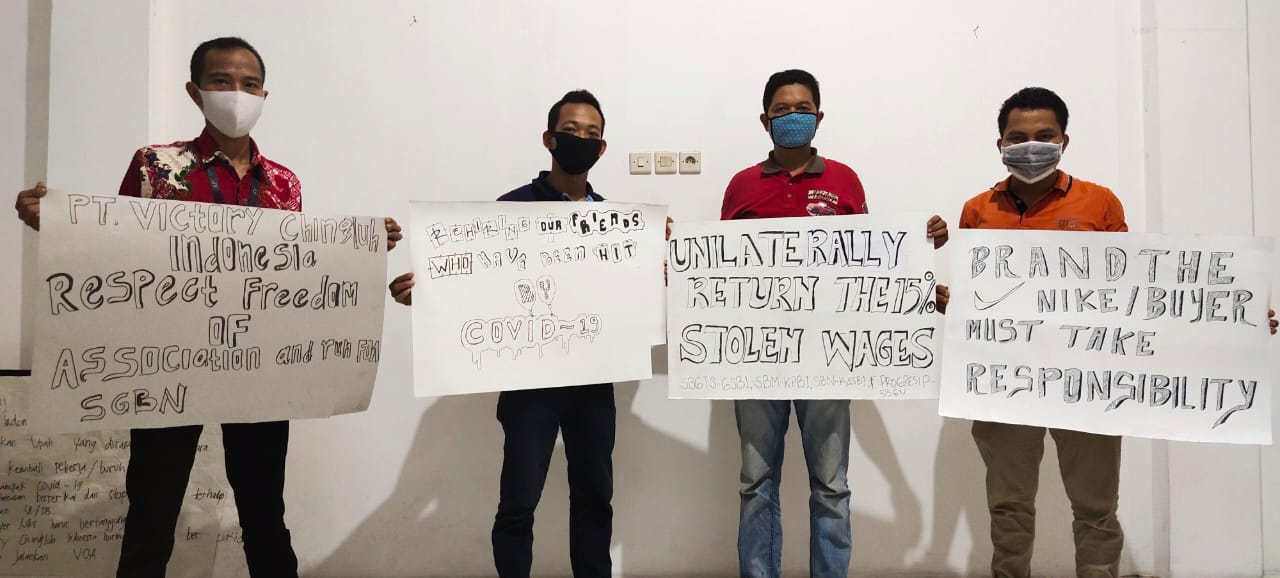
Garment workers in H&M, Primark, and Nike’s supply chains need their full wages during a pandemic
Millions of workers in garment supply chains world-wide have not been paid their full wages during the pandemic or have lost their jobs without adequate financial compensation. Today the Clean Clothes Campaign network starts a campaign calling upon brands to take responsibility for the workers that make their clothes and ensure that workers are paid what they are owed.
Garment brands and retailers around the world have responded to the lockdowns and economic insecurity caused by the pandemic by cutting down on or fully cancelling their orders with suppliers. This means that workers were left unpaid or with less than their full wages or even lost their jobs. Because of their excessive power in global supply chains, brands and retailers can set the terms and prices in the factories they produce in and basically function as principal employers. Their measures to save money and decrease business risks in the face of a pandemic have created a situation in which workers pay the price for this crisis.
In several countries, governments have officially allowed factories to pay their workers only 50-60% of the poverty wages they were receiving before the pandemic. Many other workers were left without wages or jobs even though governments urged factories not to fire workers and keep paying them in full. Worker protests against wage cuts and dismissals at factories have happened continuously since March. In Cambodia, unions have even started a national campaign to recoup the withheld wages and bonuses from the brands sourcing from the country.
In a report published last month, Clean Clothes Campaign calculated that just for the first three months of the pandemic garment workers in global supply chains are owed between 3.2-5.8 billion USD in unpaid wages, legally owed bonuses, and compensation. The Clean Clothes Campaign network urges apparel brands and retailers to commit to a wage assurance: a public commitment to ensure, by the most efficient means, that the workers in their supply chains are paid what they are owed and to enter into negotiations to establish a fund that will make sure workers can no longer be left jobless without their legally owed severance. The “Pay Your Workers” campaign launched today focuses on H&M, Primark, and Nike - three of the brands that most frequently appeared in reports from workers about worker rights violations during the pandemic -, but the call to take responsibility is directed at all garment brands and retailers with outsourced production. Over a dozen brands have already committed to ensuring their workers are paid in full during the pandemic, including Nile, Kuyichi, Taiyo, and Known Supply. It is up to bigger companies to follow suit.
“This campaign targets some of the wealthiest apparel supply chains in the world. These brands have made profits for decades on the basis of poverty wages and outsourced responsibility without contributing to any form of social protection in garment producing countries. Our campaign aims to reclaim funds for the workers, by convincing brands to take responsibility for the people who enabled great profits through their underpaid labour,” says Ineke Zeldenrust from Clean Clothes Campaign.
“Many workers in Indonesia, who already had difficulty surviving on their wages before the Covid-19 outbreak, have seen their wages cut or their jobs disappear without due compensation during the pandemic. They make clothes and shoes for international brands who have the influence and money to ensure that workers will receive their full wages and benefits. We urge brands to take responsibility for the wages owed during the pandemic and to ensure that workers will never be left with absolutely nothing again,” says Djoko Heriyono from the National Industrial Workers Union Federation SPN.
The wage assurance is deliberately open about how brands and retailers will fulfill their commitment. Some of them will prefer to work through the existing ILO Call to Action to secure loans to enable employers to pay wages, and/or to enable governments to provide facilities that will enable employers to pay wages, or to pay income directly to workers. But as the Call to Action currently does not cover all countries and not all brands have signed it, brands and retailers will all have to monitor which workers are left unpaid in their own supply chains and find other means to make sure these workers receive what they are owed in the short and longer term. This can be done through direct support, emergency funds, cooperation with employers and governments, and a guarantee fund aimed at paying severance owed in future cases.